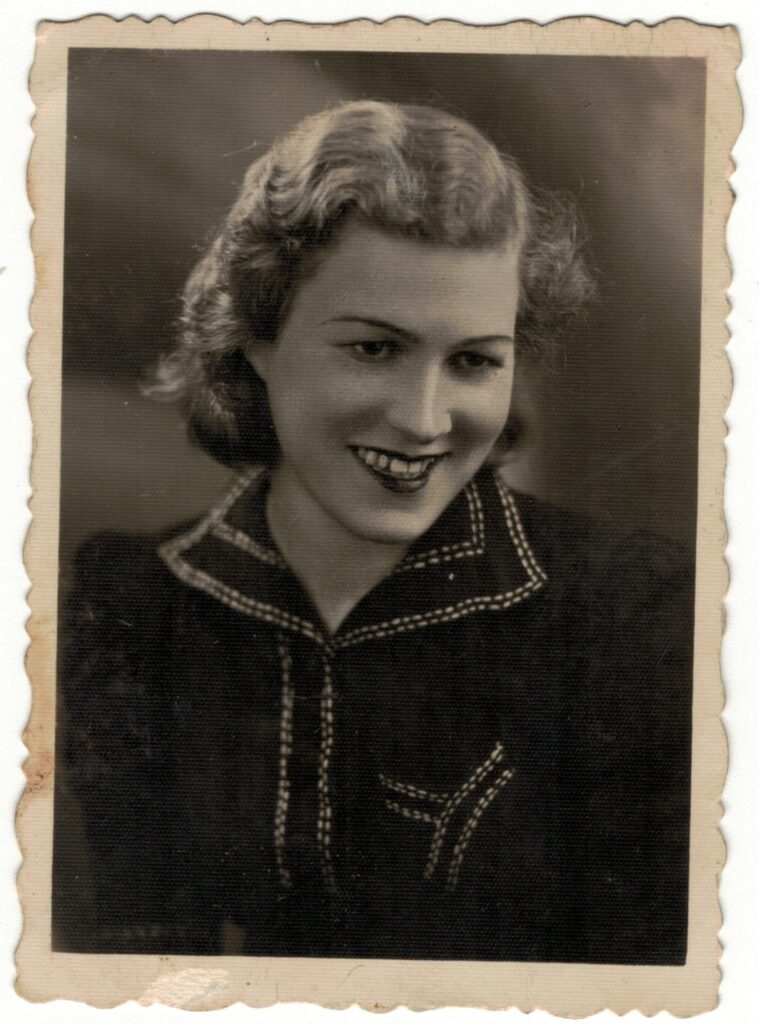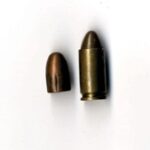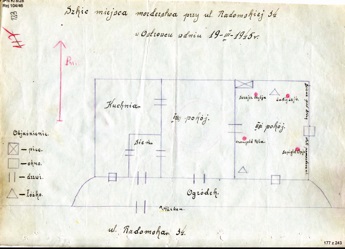19 March 1945
Below is a summary of the Murders in Ostrowiec on March 19, 1945.
It includes research done in 2021 and excerpts from the research article The Girl and the Painter by Prof. Joanna Tokarska-Bakir* (Institute of Slavic Studies PAN).
Prior to World War II, the Smolopap factory belonged to the brothers Chaskiel and Jonasz Krongold. Fajga Krongold survived and returned to her hometown of Ostrowiec and took up residence at ulica Sienkiewicza 34 (during the occupation and in its immediate aftermath it was ulica Radomska).
On 19 March 1945, the house where she was living … was raided. Apart from Fajga, ten other people were there when the attack began. They were robbed and terrorised.
Four people were shot dead:
Fajga Krongold (aged 27)
Chaja Szpigiel (28)
Otylia Szrajer (23)
Izrael Lejb Lustig (16)
Six were injured:
Lejzor Leon Szpilman (32)
Mania Szpilman (25) [wife of Leon]
Fajga Alkichen (46)
Hersz Zylberberg (19)
Jankiel Lustig (52) [father of Izrael Lejb Lustig and husband of Chana Szpilman]
Fajwel Gryner (31)
It seems that only one was not injured- Chawa Adler, also known as Janina Kędzierska (26)
The survivors all provided extensive testimonies.
Leon Szpilman’s testimony provides a more in-depth description of the attackers, as well as details of the conversations:


At 7 pm on 19th March, I came home from town …All three were armed with Vis pistols, … The tall person focused on stealing our belongings, while the small one spoke a lot, in an intelligent manner, so as maintain a sense of calm, as he was going to shoot.
Having stolen everything he could lay his hands on, the tall person told each of us to give our name, one after the other. Everyone did so. Miss Krongold, …. provided her adopted name. The short blond man said: ‘What, Kwiatkowska? This woman is Krongold, the manager of the Smołopap factory. Mrs Szpigiel also gave an adopted name. The short blond man said: ‘That’s Mrs Szpigiel, and she’s trying to find a place to live. [Otylia Szrajer], the wife of a doctor from Warsaw who had come to stay the night, said she was a Pole, and he laughed and she got the first bullet, and she died on the spot. After the first person had been killed, they shouted: ‘about turn’, and they started to shoot everybody. When everyone had been knocked to the ground, they gathered all the looted things, and the tall one said: ‘It’s done, let’s go.’ This tall man was very much the commander. The entire thing lasted 30 minutes. (…) After they had robbed everybody, they went off ….
The case of the murder on ul. Radomska would have remained, like many others, unsolved, had it not been for the fact that in mid-April, Leon Szpilman recognised one of the assailants in the street. We learn about this from a letter written by the Ostrowiec branch of the Central Committee of Polish Jews (CKŻP), whose office in the town was located at ul. Kościelna 30. The letter is dated May 9, 1945.
Citizen Szpilman and his wife were injured in an attack by bandits on Ostrowiec Jews on 19 March this year [1945]. He spent several weeks in hospital. After leaving the hospital, he recognised those who had carried out the attack, and immediately alarmed the militia, and the assailants were caught. He participated in the investigation and thanks to his energy and findings, the bandits will receive the punishment they deserve. During the investigation, it turned out that one of the arrested suspects did not play any direct role in the attack, and he was released. He is the brother of one of the bandits. He subsequently met Citizen Szpilman on the street, and threatened him, as did other inhabitants of Ostrowiec, who have not spared Citizen Szpilman. In order to protect himself, Citizen Szpilman has been temporarily forced to leave Ostrowiec.
The Perpetrators- Ludwik Krzymiński and Kazimierz Markwart
We do not know either who exactly Szpilman recognised, or how the arrests panned out. Documents pertaining to the investigation reveal only that first of all, a search was carried out at the residence of a 19-year-old member of the Home Army, Ludwik Krzymiński, …
Krzymiński came from Leszno in the Poznań region, whence he was resettled by the Germans in December 1939. Once in Ostrowiec, he attended a primary school, and his father, the Volksdeutsch mentioned earlier in the essay, became the treuhaender (administrator) of the Smołopap factory, which had belonged to the Krongold brothers before the war. When the younger Krzymiński was searched, a wallet containing

On the day of the attack, Krzymiński went over to Markwart’s flat, where the latter was doing his Latin homework with his friends, Janusz Winiarski and Bogdan Krawczyk. Krzymiński said that ‘the job has to be carried out today, that’s the order,’ and gave them weapons: two pistols, two Llamas and a Smith and Wesson. He clarified that a Jewess, Felicja Kwiatkowska-Krongold, was living at ul. Radomska 34. ‘The sentence against her has to be carried out, and as a precaution, everyone in that flat has to be killed, steal what you can, just in case people get found out, and money is needed to cover the costs of the hide-out’. There were not supposed to be many people in Miss Krongold’s flat that day.
Krzymiński’s subsequent testimonies reveal that although he planned the attack on his own, he instructed three other people to carry it out: 19-year-old Kazimierz Markwart, who he recruited as part of the team with the aim of ‘shooting Jews’, and also two school friends of Markwart’s, Janusz Winiarski and Bogdan Krawczyk. As far as these two are …, we only know that they had been members of the Home Army ‘serving under the Staff [the 2nd Legions Infantry Division] of Colonel ‘Rope’ [Aleksander Żółkiewski]’. Janusz Winiarski used the cryptonym Nettle [Pokrzywa] and resided in Ostrowiec at ul. Traugutta, while Bogdan Krawczyk, cryptonym Borski, lived at ul. Bródno. Krzymiński does not explain why he did not take part in the execution himself.
‘I gave the first order to carry out the sentence on Krongold on 19th March 1945, sending Bogdan Krawczyk, Janusz Winiarski and Kazimierz Markwart, arming them with two 9 calibre Llama pistols and one 9 calibre Smith.’
The Sentencing
…The Court read out the death sentence for both defendants, depriving them of their civil rights once and for all, and likewise imposing forfeiture of property. Part of the justification was as follows: ‘The Court has arrived at the conclusion that the most complete removal of Krzymiński Ludwik and Markwart Kazimierz from society, in the form of depriving them of their lives, is dictated (ultima ratio) by the indispensable, ineluctable and inevitable necessity of protecting society as whole, on account of the defendants exceptionally anti-social qualities (characters bordering on bestial), and no condition, provided for by humanitarian legislation, which does not provide for crematoria, is able to remove these qualities by deprivation of liberty, and thus it is beyond doubt that no alternative punishment of the accused Krzymiński and Markwart will change them mentally, and indeed no other punishment will protect society against them.’
… On 6 August 1946, the Supreme Military Court in Warsaw upheld the verdict. … Thereafter, the documentation of the case has only two official records, bearing the information that the death sentence was carried out at the prison in Radom on 3 September 1946.
* About Prof. Joanna Tokarska-Bakir
Prof. Joanna Tokarska-Bakir is a professor in the Polish Academy of Sciences, focusing on the postwar anti-Jewish pogroms and the Holocaust in the Polish countryside. She was awarded the Yad Vashem International Book Prize (2018) for her book “Cursed” about the Kielce pogrom on July 4, 1946.
Prof. Tokarska-Bakir has recently completed a book containing details on the Ostrowiec murder of March 19, 1946 in which Fajga Krongold and her friends perished. A chapter of the book is available here for a limited time.
The book (with the Ostrowiec text as one of its chapters) will be published soon by the Peter Lang Publishing House. Details of the book will follow.
For those who may have additional details/comments regarding the above event, please contact [email protected].
